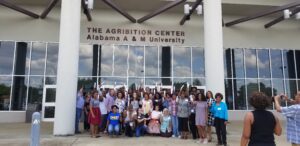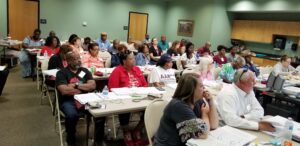Final report for SAL17-002
Project Information
Alabama SARE program (Auburn University and Alabama A&M University combined) serves over 1000 small producers, educators, and community gardeners each year since 2010. A major limitation of organic production system is insect pest pressure in the south and the Alabama SARE program directly assists producers in reducing vegetable production loss and crop contamination. SARE program at Auburn University provides multi-level hands-on training to small producers with immediately useful information. SARE program at Alabama A&M supports small urban farms and community gardeners in the northern parts of the state. This proposal essentially supports the Alabama Sustainable Agriculture Program and proposes development of content using complex digital media while focusing on collaboration between institutions and program delivery via farm incubators and nonprofits for standardized distance education system. This proposal will continue to focus on train-the-trainer part more intensively with Auburn and Alabama A&M Universities cross-training Extension agents and county coordinators using a mix of online and on-farm training.
Advisors
- (Educator)
- (Educator)
- (Educator and Researcher)
- (Educator)
- (Educator and Researcher)
Education & Outreach Initiatives
Provide educational, training material, and travel scholarships support for fresh produce training for producers that may come under new USDA-FSMA regulations

2018-PSA-TRAINING-PROGRAM.-AGENDA.-TENTATIVE

Two train the trainer workshops were conducted Spring & Fall. The SARE professional development program provided educational, training materials, and travel scholarship for out of town attendants.
Provide educational, training material, and travel scholarships support for fresh produce training for producers that may come under new USDA-FSMA regulations
Two train the trainer workshops were conducted Spring & Fall. The SARE professional development program provided educational, training materials, and travel scholarship for out of town attendants.
The goal of this event was to demonstrate a few options on cool-season forages that could provide nutrition for large and small ruminants during a time of the year when grazing material tends to be sparse. Failure to provide sufficient nutrition during winter months can result in poor body-condition, lackluster vigor and productivity, and complications with health and reproduction.
Event was held May 8 at the Winfred Thomas Agricultural Research Station in Hazel Green, AL from 6-8 PM. Meeting facility and site for field day were provided at no charge with an estimated value of $450 including light food, snacks, and drinks. Field day was attended by 20 adults with 7 being representatives from Alabama A&M University, Alabama Cooperative Extension System, and USDA: NRCS. This event was made possible by: a Southern SARE Grant, an AMRV RC&D Education Grant, and support from ACES and AAMU. The forage site was at the Small Ruminant Outreach Center grazing paddocks, and winter forage seed money ($400) was provided by a Southern SARE Grant. Two of the attendees were new to farming.
This event used a combination of site-visits to view wheat, rye, clover, winter peas, and a mix of the fore mentioned; grazing and forage experts to discuss options and management; questions and answers among attendees and experts, and hand-outs with relevant information. Other topics included Renewable Energy Program for farmers and small businesses, and availability of Southern SARE Grants.
Diversity of 20 attendees included:
- All adult
- 17 Male, 3 Female
- 3 American Indian, 1 Asian, 4 Black, 11 White, & 1 Other
At the end of event each attendee was provided an evaluation form, 92% of evaluations were completed. Post event evaluation showed:
- Is your farm already registered with local USDA Service Center? 10-Yes, 2-No
- Is this the first time for you to attend an Extension event? 2-Yes, 10-No
- Are you interested in the renewable energy program? 3-Yes, 4-Maybe, 5-No
- Did you find the site visit to winter forages of interest? 11-Yes, 1-Somewhat
- Did you learn more about winter grazing options? 11-Yes, 1-Somewhat
- Will you implement some of these practices next fall? 7-Yes, 5-Maybe
- Do you believe this would increase nutrition for livestock and reduce feed costs? 10-Yes, 2-Somewhat
- Would this maintain or increase body-condition of your livestock during winter months? 7-Yes, 5-Somewhat
- Would this increase the vigor or productivity of your livestock? 5–Yes-,7- Maybe
- Do you feel tonight’s information would make improvements/efficiencies on your farm? 9-Yes, 3-Maybe
- Do you feel these type practices would increase the likelihood for long-term sustainability and/or profitability? 11-Yes, 1-No.
- Would you recommend this type of program to friends? 11-Yes, 1-No
This event used a combination of site-visits to view wheat, rye, clover, winter peas, and a mix of the fore mentioned; grazing and forage experts to discuss options and management; questions and answers among attendees and experts, and hand-outs with relevant information. Other topics included Renewable Energy Program for farmers and small businesses, and availability of Southern SARE Grants.
Provide educational training and training material (STEM Garden Curricula & Demonstration garden) to educational professionals to increase agriculture sustainable practice awareness within city schools
Train the Trainer workshops were conducted at an elementary and middle school which do not have an agriculture curriculum within their science program.
Schools were encouraged to explore sources of extramural funding for building material support of raised bed gardens.
Regional Extension Agents trained with the STEM curriculum served as instructors for the train the trainer workshops.
Extension volunteers were used to provide continued garden mentoring to support sustainability.
Demonstration gardens were supported for two grades (1st and 3rd). Each grade level is supported by 5 educational professionals and serves 115 minority students.
Provide Extension Professional In-Service training in FSMA food safety training updates, Agriculture Awareness STEM Gardens, Sustainable Nursery Production & Conservation Practices
Provide educational in-service training (Workshops - 2, and Field Day Tours - 2) and training material (STEM Garden curricula & Extension publication - GMO Food Facts).
Two In-Service workshops were conducted (Spring and Fall) to provide the latest information on FSMA food safety training updates, Agriculture Awareness STEM Gardens, Sustainable Nursery Production & Conservation Practices.
Extension professionals within the Home Grounds programming team asked for this type of information to help support their current effort to promote sustainable production practices to small farm producers within urban communities.
SARE resources has helped provide trainer and small farmer training as well as provide support to AAMU's Small Farms Research Center.